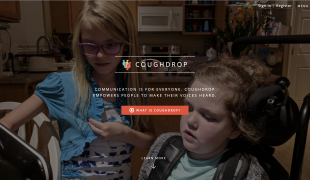- 3270
- 284
- 11
- 10
- 0
- Help Ukraine
About the solution
Children with cerebral palsy, which is a group of disorders that have an impact on movement, balance, and posture stability, require daily sessions with a physical therapist to build strength and improve motor skills. As an undergraduate studying bioengineering at Columbia University, Blynn Shideler realized that equitable access to such services is a major barrier for many kids and so ought to create an alternative.
The result was BUDI – the Biofeedback Upper-limb Device for Impairment – a bulky bracelet built with sensors that followed motion and provided feedback on how the user might want to adjust how they are moving. It was considered “Most Outstanding Design Project from Columbia Biomedical Engineering,” and even people in the cerebral palsy community noticed and reached out. A teenager in Ohio who had the medical condition saw the news of the product and was willing to try it.
However, Shideler had no bracelets to provide, as he and his team had only built two prototypes. So, inspired by the message from a real patient, Shideler set out to produce BUDI on a larger scale.
In the fall of 2021, Shideler enrolled in Stanford School of Medicine and planned to start a program that would give children with cerebral palsy the opportunity to try technologies for improving mobility. He took some classes that pushed his idea forward and made him realize that maybe BUDI could be designed as software on a commercially available smartwatch instead of building bracelets from scratch.
To build out the BUDI app, Shideler worked with 3 other students: Stanford computer science student Taylor Lallas, Stanford graduate Maria Shcherbakova, and Ohio State biomedical engineering student Mihir Joshi.
The first version is a platform where users can follow along with therapeutic exercises on an iPhone while motion data from a user’s Apple Watch is sent to the iPhone in real-time to provide biofeedback, creating an interactive mobility training program. User data is stored in HIPAA-compliant security on Google Cloud and fully integrated into Apple Fitness to track therapy in Apple Health and see progress over time. BUDI also establish communication between therapy providers and their patients, which enables pediatric users to gain autonomy in their own therapy.
The main goal of the project is to ultimately give patients some autonomy, help alleviate problems created by a shortage of physical therapists and reduce the strain on families who currently take their children to therapy every day.
This story was adapted from: https://news.stanford.edu/report/2022/07/22/digital-solution-kids-cerebr...
The images were taken from: https://news.stanford.edu/report/2022/07/22/digital-solution-kids-cerebr... and https://budiapp.webflow.io/ , as we do not own any of them.
这些解决方案不应包括使用药物,化学品或生物制品(包括食品);创伤性设备;冒犯性的,商业或内在危险的内容。该解决方案未经医学验证。请谨慎进行!如果您有任何疑问,请咨询健康专家。
DISCLAIMER: This story was written by someone who is not the author of the solution, therefore please be advised that, although it was written with the utmost respect for the innovation and the innovator, there can be some incorrect statements. If you find any errors please contact the patient Innovation team via info@patient-innovation.com
-
-
608
-
0
-
9849

Multiple sclerosis patient develops map to help people with disabilities
CAREGIVING
MOVING IN A WHEELCHAIR: Moving using a wheelchair.
WALKING WITH A WALKING AID: Walking with a walking aid
WALKING: Walking
Multiple Sclerosis
Website
App (Including when connected with wearable)
Restoring mobility
Enhancing health literacy
Promoting self-management
Rehabilitating After Stroke
Managing Neurological Disorders
Building Supportive Community Relationships
Promoting inclusivity and social integration
Recovering from Traumatic Injuries
Enhancing Mental Health
Raise awareness
Caregiving Support
General and Family Medicine
Internal Medicine
Neurology
Neurosurgery
Physical Medicine and Rehabilitation
United States
-
-
-
306
-
0
-
3438

Brian Whitmer, a software developer and father, created a communication system for his daughter with Rett Syndrome.
COMMUNICATION: Communicating, whether by speaking, listening, or other means
Neuromuscular Disorders
Videogame
App (Including when connected with wearable)
Enhancing health literacy
Managing Neurological Disorders
Building Supportive Community Relationships
Promoting inclusivity and social integration
To improve Treatment/Therapy
Preventing (Vaccination, Protection, Falls, Research/Mapping)
Raise awareness
Caregiving Support
General and Family Medicine
Internal Medicine
Neurology
Pediatrics
Physical Medicine and Rehabilitation
United States
-
-
-
342
-
0
-
4230

Collaborator Pierluigi Mantovani creates Evolution Devices - solutions that aim to transform Multiple Sclerosis Management
CAREGIVING
BODY BALANCE: Maintaining body balance
STANDING UP: Standing up from a seated position
WALKING: Walking
Multiple Sclerosis
Assistive Daily Life Device (to help ADL)
Walking Aid (wheelchair/walker/crutches)
App (Including when connected with wearable)
AI algorithm
Body-Worn solutions (Clothing, accessories, shoes, sensors...)
Restoring mobility
Regaining sensory function
Managing pain
Promoting self-management
Preserving Organ Function
Managing Neurological Disorders
Maintaining Balance and Mobility
To improve Treatment/Therapy
Preventing (Vaccination, Protection, Falls, Research/Mapping)
Raise awareness
Caregiving Support
General and Family Medicine
Internal Medicine
Medical Genetics
Neurology
Physical Medicine and Rehabilitation
United States
-
 zh
zh